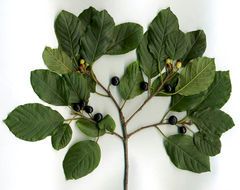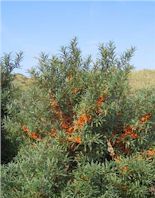 |
The common Buckthorn grows in our woods and thickets, and used to be popularly known because of the purgative syrup made from its juice and berries. It bears dense branches of small green flowers, followed by the black berries, which purge violently. If gathered before they are ripe they furnish a yellow dye. When ripe, if mixed with gum arabic and lime water, they form the pigment called "Bladder Green." Until late in the
present century O dura ilia messorum English rustics, when requiring an aperients dose for themselves or their children, had recourse to the syrup of Buckthorn. But its action was so severe, and attended with such painful griping, |
that as time went on the medicine was discarded, and it is now employed in this respect almost exclusively by the cattle doctor. Dodoeus taught about Buckthorn berries: "They be not meet to be administered but to young and lusty people of the country, which do set more store of their money than their lives." The shrub grows chiefly on chalk, and near brooks. The name Buckthorn is from the German buxdorn, boxthorn, hartshorn. In
Anglo-Saxon it was Heorot-bremble. It is also known as Waythorn, Rainberry Thorn, Highway Thorn and Rhineberries. Each of the berries contains four seeds: and the flesh of birds which eat thereof is said to be purgative. When the juice is given medicinally it causes a bad stomach-ache, with much dryness of the throat: for which reason Sydenham always ordered a basin of soup to be given after it. Chemically the active principle of the
Buckthorn is "rhamno-cathartine." Likewise a milder kind of Buckthorn, which is much more useful as a Simple, grows freely in England, the Rhamnus frangula or so-called "black berry-bearing Alder," though this appellation is a mistake, because botanically the Alder never bears any berries. This black Buckthorn is a slender shrub, which occurs in our woods and thickets. The juice of its berries is aperients, without being irritating,
and is well suited as a laxative for persons of delicate constitution. It possesses the merit of continuing to answer in smaller doses after the patient has become habituated to its use. The berry of the Rhamnus frangula may be known by its containing only two seeds. Country people give the bark boiled in ale for jaundice; and this bark is the black dogwood of gunpowder makers. Lately a certain aperient medicine has become highly
popular with both doctors and patients in this country, the same being known as Cascara Sagrada. It is really an American Buckthorn, the Rhamnus Persiana, and it possesses no true advantage over our black Alder Buckthorn, though the bark of this latter must be used a year old, or it will cause griping. A fluid extract of the English mild Buckthorn, or of the American Cascara, is made by our leading druggists, of which from half to
one teaspoonful may be given for a dose. This is likewise a tonic to the intestines, and is especially useful for relieving piles. Lozenges also of the Alder Buckthorn are dispensed under the name of "Aperient Fruit Lozenges;" one, or perhaps two, being taken for a dose as required.
 |
There is a Sea Buckthorn, Hippophoe, which belongs to a different natural order, Eloeagnaceoe, a low shrubby tree, growing on sand hills and cliffs, and called also Sallowthorn. The fruit is made (in Tartary) into a pleasant jelly, because of its acid flavor, and used in the Gulf of Bothnia for concocting a fish sauce.
The name signifies "giving light to a horse," being conferred because of a supposed power to cure equine blindness; or it may mean "shining underneath," in allusion to the silvery underside of the leaf.
The old-fashioned Cathartic Buckthorn of our hedges and woods has spinous |
thorny branchlets, from which its name, Rhamnus, is thought to be derived, because the shrub is set with thorns like as the ram. At one time this Buckthorn was a botanical puzzle, even to Royalty, as the following lines assure us:
"Hicum, peridicum; all clothed in green;
The King could not tell it, no more could the Queen;
So they sent to consult wise men from the East.
Who said it had horns, though it was not a beast."
Herb Simples
The Primitive Simplers presented here show the way of life in other generations, it is not suggested or recommended trying them yourself. |



